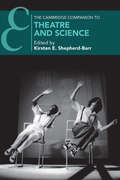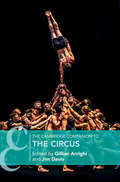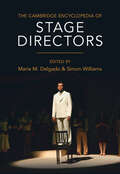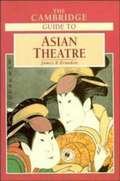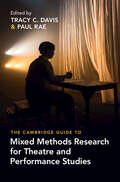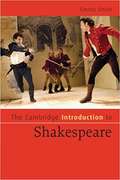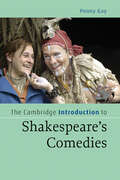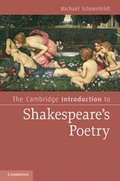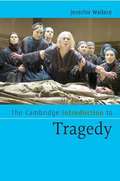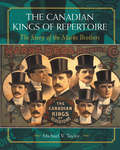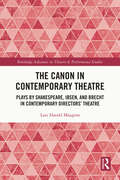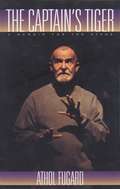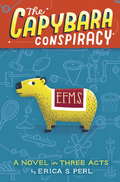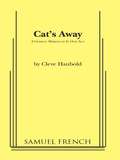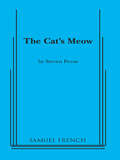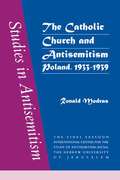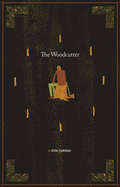- Table View
- List View
The Cambridge Companion to Theatre and Science (Cambridge Companions to Theatre and Performance)
by Shepherd-Barr, Kirsten E.Theatre has engaged with science since its beginnings in Ancient Greece. The intersection of the two disciplines has been the focus of increasing interest to scholars and students. The Cambridge Companion to Theatre and Science gives readers a sense of this dynamic field, using detailed analyses of plays and performances covering a wide range of areas including climate change and the environment, technology, animal studies, disease and contagion, mental health, and performance and cognition. Identifying historical tendencies that have dominated theatre's relationship with science, the volume traces many periods of theatre history across a wide geographical range. It follows a simple and clear structure of pairs and triads of chapters that cluster around a given theme so that readers get a clear sense of the current debates and perspectives.
The Cambridge Companion to Tom Stoppard
by Katherine E. KellyThis collection of fifteen essays offers both student and theatergoer a guide to the stage plays, novel, and screenplays of one of the most celebrated British dramatists since Noel Coward. Readers will find that the general and accessible description and analyses in these essays makes the large body of Stoppard's writing clear and approachable while preserving its rich humor. This is the first collection of essays to appear in many years addressing all of Stoppard's major work. It provides insights into the recent plays, Arcadia and Invention of Love, as well as the first extended examination of his work for screen, including a discussion of his co-authored, academy award-winning screenplay Shakespeare in Love. Photographs from key productions, a biography and chronology complete the volume and prepare the reader for future work by this extraordinary writer.
The Cambridge Companion to Twentieth-Century Irish Drama
by Shaun RichardsThe essays in this collection cover the entire range of Irish drama, from the late nineteenth-century melodramas (anticipating the rise of the Abbey Theatre) to the contemporary Dublin of theater festivals. In addition to studies of individual playwrights, the collection includes an examination of the relationship between the theater and its political context as reflected through its ideology, staging and programming. Including a complete chronology and bibliography, this collection will be an important introduction to one of the world's most vibrant theater cultures.
The Cambridge Companion to Victorian and Edwardian Theatre
by Kerry PowellThis 2004 Companion is designed for readers interested in the creation, production and interpretation of Victorian and Edwardian theatre, both in its own time and on the contemporary stage. The volume opens with a brief overview and introduction surveying the theatre of the time followed by an essay contextualizing the theatre within the frame of Victorian and Edwardian culture as a whole. Succeeding chapters examine specific aspects of performance, production, and theatre, including the music, the actors, stagecraft and the audiences themselves; plays and playwriting and issues of class and gender are also explored. Chapters also deal with comedy, farce and melodrama, while other essays bring forward new topics and approaches that cross the boundaries of traditional investigation, including analysis of the economics of theatre and of the theatricality of personal identity.
The Cambridge Companion to the Circus (Cambridge Companions to Theatre and Performance)
by Jim Davis Gillian ArrighiThe Cambridge Companion to the Circus provides a complete guide for students, scholars, teachers, researchers, and practitioners who are seeking perspectives on the foundations and evolution of the modern circus, the contemporary extent of circus studies, and the specialised literature available to support further enquiries. The volume brings together an international group of established and emerging scholars working across the multi-disciplinary domain of circus studies to present a clear overview of the specialised histories, aesthetics and distinctive performances of the modern circus. In sixteen commissioned essays, it covers the origins in commercial equestrian performance during the late-eighteenth century to contemporary inflections of circus arts in major international festivals, educational environments, and social justice settings.
The Cambridge Companion to the Musical
by William A. Everett Paul R. LairdTracing the development of the musical on both Broadway and in London's West End, this updated Companion continues to provide a broad and thorough overview of one of the liveliest and most popular forms of musical performance. Ordered chronologically, essays cover from the American musical of the nineteenth century through to the most recent productions, and the book also includes key information on singers, audience, critical reception, and traditions. All of the chapters from the first edition remain - several in substantially updated forms - and five completely new chapters have been added, covering: ethnic musicals in the United States; the European musical; Broadway musicals in revival and on television; the most recent shows; and a case study of the creation of the popular show Wicked based on interviews with its creators. The Companion also includes an extensive bibliography and photographs from key productions.
The Cambridge Encyclopedia of Stage Directors
by Maria M. Delgado Simon WilliamsWith a broader range of entries than any other reference book on stage directors, this Encyclopedia showcases the extraordinary diversity of theatre as a national and international artistic medium. Since the mid nineteenth century, stage directors have been simultaneously acclaimed as prime artists of the theatre and vilified as impediments to effective performance. Their role may be contentious but they continue to exert powerful influence over how contemporary theatre is made and engaged with. Each of the entries - numbering over 1,000 - summarises a stage director's career and comments on the distinctive characteristics of their work, alluding to broader traditions where relevant. With an introduction discussing the evolution of the director's role across the globe and bibliographic references guiding further reading, this volume will be an invaluable reference work for stage directors, actors, designers, choreographers, researchers, and students of theatre seeking to better understand how directors work across different cultural traditions.
The Cambridge Guide to Asian Theatre
by James R. BrandonThis paperback edition, incorporating corrections and updates, contains more distilled information on the theatrical arts of Asia-Oceania than any other single volume yet published. A broad-ranging pan-Asian essay lucidly explores the basic themes of ritual, dance, puppetry, masks, training, performance, while national entries provide the historical development of theater in twenty countries. Major theater forms of each country are accompanied by entries on significant playwrights, actors and directors. An index and reading lists make this work indispensable.
The Cambridge Guide to Mixed Methods Research for Theatre and Performance Studies
by Tracy C. Davis Paul RaeWe often know performance when we see it – but how should we investigate it? And how should we interpret what we find out? This book demonstrates why and how mixed methods research is necessary for investigating and explaining performance and advancing new critical agendas in cultural study. The wide range of aesthetic forms, cultural meanings, and social functions found in theatre and performance globally invites a corresponding variety of research approaches. The essays in this volume model reflective consideration of the means, processes, and choices for conducting performance research that is historical, ethnographic, aesthetic, or computational. An international set of contributors address what is meant by planning or designing a research project, doing research (locating and collecting primary sources or resources), and the ensuing work of interpreting and communicating insights. Providing illuminating and necessary guidance, this volume is an essential resource for scholars and students of theatre, performance, and dance.
The Cambridge Introduction to Performance Theory
by Simon ShepherdWhat does 'performance theory' really mean and why has it become so important across such a large number of disciplines, from art history to religious studies and architecture to geography? In this introduction Simon Shepherd explains the origins of performance theory, defines the terms and practices within the field and provides new insights into performance's wide range of definitions and uses. Offering an overview of the key figures, their theories and their impact, Shepherd provides a fresh approach to figures including Erving Goffman and Richard Schechner and ideas such as radical art practice, performance studies, radical scenarism and performativity. Essential reading for students, scholars and enthusiasts, this engaging account travels from universities into the streets and back again to examine performance in the context of political activists and teachers, countercultural experiments and feminist challenges, and ceremonies and demonstrations.
The Cambridge Introduction to Scenography
by Philip Butterworth Joslin MckinneyScenography - the manipulation and orchestration of the performance environment - is an increasingly popular and key area in performance studies. This book introduces the reader to the purpose, identity and scope of scenography and its theories and concepts. Settings and structures, light, projected images, sound, costumes and props are considered in relation to performing bodies, text, space and the role of the audience. Concentrating on scenographic developments in the twentieth century, the Introduction examines how these continue to evolve in the twenty-first century. Scenographic principles are clearly explained through practical examples and their theoretical context. Although acknowledging the many different ways in which design shapes the creation of scenography, the book is not exclusively concerned with the role of the theatre designer. In order to map out the wider territory and potential of scenography, the theories of pioneering scenographers are discussed alongside the work of directors, writers and visual artists.
The Cambridge Introduction to Shakespeare
by Emma SmithThis lively and innovative 2007 introduction to Shakespeare promotes active engagement with the plays, rather than recycling factual information. Covering a range of texts, it is divided into seven subject-based chapters: Character; Performance; Texts; Language; Structure; Sources and History, and it does not assume any prior knowledge. Instead, it develops ways of thinking and provides the reader with resources for independent research through the 'Where next?' sections at the end of each chapter. The book draws on up-to-date scholarship without being overwhelmed by it, and unlike other introductory guides to Shakespeare it emphasizes that there is space for new and fresh thinking by students and readers, even on the most-studied and familiar plays.
The Cambridge Introduction to Shakespeare's Comedies
by Penny GayWhy did theatre audiences laugh in Shakespeare's day? Why do they still laugh now? What did Shakespeare do with the conventions of comedy that he inherited, so that his plays continue to amuse and move audiences? What do his comedies have to say about love, sex, gender, power, family, community, and class? What place have pain, cruelty, and even death in a comedy? Why all those puns? In a survey that travels from Shakespeare's earliest experiments in farce and courtly love-stories to the great romantic comedies of his middle years and the mould-breaking experiments of his last decade's work, this book addresses these vital questions. Organised thematically, and covering all Shakespeare's comedies from the beginning to the end of his career, it provides readers with a map of the playwright's comic styles, showing how he built on comedic conventions as he further enriched the possibilities of the genre.
The Cambridge Introduction to Shakespeare's Poetry
by Michael SchoenfeldtShakespeare's poems, aside from the enduring appeal of the Sonnets, are much less familiar today than his plays, despite being enormously popular in his lifetime. This Introduction celebrates the achievement of Shakespeare as a poet, providing students with ways of understanding and enjoying his remarkable poems. It honours the aesthetic and intellectual complexity of the poems without making them seem unapproachably complicated, outlining their exquisite pleasures and absorbing enigmas. Schoenfeldt suggests that today's readers are better able to analyze aspects of the poems that were formerly ignored or the source of scandal - the articulation of a fervent same-sex love, for example, or the incipient racism inherent in a hierarchy of light and dark. By engaging closely with Shakespeare's major poems - Venus and Adonis, Lucrece, The Phoenix and the Turtle, the Sonnets and A Lover's Complaint - the Introduction demonstrates how much these extraordinary poems still have to say to us.
The Cambridge Introduction to Theatre Directing
by Christopher Innes Maria ShevtsovaThis Introduction is an exciting journey through the different styles of theatre that twentieth-century and contemporary directors have created. It discusses artistic and political values, rehearsal methods and the diverging relationships with actors, designers, other collaborators and audiences, and treatment of dramatic material. Offering a compelling analysis of theatrical practice, Christopher Innes and Maria Shevtsova explore the different rehearsal and staging principles and methods of such earlier groundbreaking figures as Stanislavsky, Meyerhold and Brecht, revising standard perspectives on their work. The authors analyse, as well, a diverse range of innovative contemporary directors, including Ariane Mnouchkine, Elizabeth LeCompte, Peter Sellars, Robert Wilson, Thomas Ostermeier and Oskaras Koršunovas, among many others. While tracing the different roots of directorial practices across time and space, and discussing their artistic, cultural and political significance, the authors provide key examples of the major directorial approaches and reveal comprehensive patterns in the craft of directing and the influence and collaborative relationships of directors.
The Cambridge Introduction to Theatre Studies
by Christopher B. BalmeProviding thorough coverage of the methods and tools required in studying historical and contemporary theatre, this Introduction examines the complexities of a rapidly changing and dynamic discipline. Following a cross-cultural perspective, the book surveys the ways theatre and performance are studied by looking initially at key elements such as performers, spectators and space. The central focus is on methodology, which is divided into sections covering theatre theory, historiography and textual and performance analysis. The book covers all the main theatrical genres - drama, opera and dance - providing students with a comparative, integrated perspective. Designed to guide students through the academic dimension of the discipline, the volume emphasizes questions of methodology, research techniques and approaches, and will therefore be relevant for a wide variety of theatre studies courses. Informative textboxes provide background on key topics, and suggestions for further reading are included at the end of each chapter.
The Cambridge Introduction to Tragedy
by Jennifer WallaceTragedy is the art-form created to confront the most difficult experiences we face: death, loss, injustice, thwarted passion, despair. From ancient Greek theatre up to the most recent plays, playwrights have found, in tragic drama, a means to seek explanation for disaster. But tragedy is also a word we continually encounter in the media, to denote an event which is simply devastating in its emotional power. This introduction explores the relationship between tragic experience and tragic representation. After giving an overview of the tragic theatre canon - including chapters on the Greeks, Shakespeare, Ibsen, Chekhov, post-colonial drama, and Beckett - it also looks at the contribution which philosophers have brought to this subject, before ranging across other art-forms and areas of debate. The book is unique in its chronological range, and brings a wide spectrum of examples, from both literature and life, into the discussion of this emotional and frequently controversial subject.
The Canadian Kings of Repertoire: The Story of the Marks Brothers
by Michael V. TaylorThe Marks Brothers may well have been the most remarkable theatrical family in Canadian history. A phenomenon on the vaudeville circuit, the seven brothers left the farm and took to the boards and the footlights throughout the latter part of the 19th century and into the 1920s. The brothers from Christie Lake, near Perth in Eastern Ontario, played to an estimated eight million Canadians, as well as to sizeable audiences in the United States. Their road shows, largely melodramas and comedy, kept audiences crying, booing, laughing and cheering until movies sounded the death knell for touring repertory companies. The publication of The Canadian Kings of Repertoire brings back for one more curtain call the seven Marks boys, top hats, diamond rings and all. Joining them in a farewell performance are their glamorous leading ladies and a superb cast of supporting players. So clear the aisles and up with the curtain. It’s showtime once more.
The Canon in Contemporary Theatre: Plays by Shakespeare, Ibsen, and Brecht in Contemporary Directors’ Theatre (ISSN)
by Lars Harald MaagerøThis book explores the relationship between contemporary theatre, particularly contemporary theatre directors, and the dramatic canon of plays.Through focusing on productions of plays by three canonical playwrights (Shakespeare, Ibsen, and Brecht) by eight contemporary European directors (Michael Buffong, Joe Hill-Gibbins, and Emma Rice from the UK, Christopher Rüping from Germany, Thorleifur Örn Arnarsson from Iceland, and Kjeriski Hom, Alexander Mørk-Eidem, and Sigrid Strøm Reibo from Norway) the book investigates why and how the theatre continues to engage with canonical plays. In particular, the book questions the political and cultural implications of theatrical reproductions of the literary canon. Drawing on Chantal Mouffe’s theories of agonism and ‘critical art,’ the book investigates whether theatrical reproduction of the canon always reconstitutes the hegemonic values and ideologies of the canon, or whether theatrical interventions in the canon can challenge such values and ideologies, and thereby also challenge the dominant ideologies and hegemonies of contemporary culture and society.This study will be of great interest to academics and students in drama and theatre, particularly those who work with theatre in the twenty-first century, directors’ theatre, and the political impact of theatre.
The Captain's Tiger
by Athol FugardWorld renowned South African playwright Athol Fugard recreates the world of his youth in his newest play, based on his experiences aboard a tramp steamer. This critically acclaimed drama has already had productions in Los Angeles, Washington D.C., Princeton N.J., and at the Spoleto Festival in South Carolina. The New York premiere is schedules for January 1999, staring Mr. Fugard.
The Capybara Conspiracy: A Novel in Three Acts
by Erica S. PerlFans of Tim Federle and Louis Sachar will love this hilarious story of what happens when the non-jocks kidnap their sports-obsessed school's beloved mascot. Seventh-grade playwright Olive Henry is frustrated by her middle school's lack of appreciation for anything but sports. While the principal drones on and on during morning announcements about the sports teams' victories, all non-athletic club meetings are relegated to the school basement, never to be mentioned on the loudspeaker. So Olive and her best friend, Reynaldo, hatch a plan to kidnap the school's capybara mascot, planning to return it, heroically, just in time for the school's pep rally and claim a reward: permission for their drama club to practice in the auditorium. And, hopefully, some overdue respect for the school's non-athletes. But when an animal-rights student activist and an undercover athlete with murky motivations join in the conspiracy, their plans--along with Cappy the capybara--veer wildly out of Olive's control.
The Cat's Away
by Cleve HauboldAnother play woven around another set of daft characters from San Francisco's Union Street. Crusty but confused Estelle Bentwood insists her cat, Miss Pearl, has been writing naughty sea faring novels on her Underwood. Her niece, Mary, and Horace, the long suffering waiter, almost talk her out of the notion-- when an excitable publisher shows up with a manuscript, a contract, certified check and a passion for Miss Pearl! There's laughable confusion to comic chaos as everyone tries to close the deal in a different way. In the unexpected climax. Miss Pearl herself appears-- and her unlikely visit is a shock to everyone. Lovable off beat characters and an ingenious plot full of surprises makes this play an audience pleaser.
The Cat's Meow
by Steven PerosFull Length, Comic Drama / 6 m, 8 f, Doubling is possible / Based on the true story of a mysterious Hollywood death, The Cat's Meow offers a fascinating cross section of Jazz Era characters who intersect for one notorious weekend on board William Randolph Hearst's yacht in 1924. The play was adapted for film in 2002, with a screenplay by the author, directed by Peter Bogdanovich, and starring Kirsten Dunst, Eddie Izzard, and Edward Herrmann. Weekend guests include: Charlie Chaplin, who has been carrying on with movie star Marion Davies, a secret known to Davies' paramour, the married - and much older -- Hearst; and movie mogul Thomas Ince, who is hoping to revive his flagging fortunes by forming a partnership with Hearst. Playing with fire, Ince tries to convince Hearst that he can handle both Marion's movie career... and her private life as well. During its 1997 Los Angeles premiere, audiences and critics were both entertained and moved by this darkly comic morality play, laced with clandestine romance, Hollywood excess, and steadily heating tensions, which erupt in a shocking act of violence. "Hearst Yacht Mystery is The Cat's Meow...A stylish and sardonically funny expose of corrupt Tinseltown values." -Los Angeles Times
The Catholic Church and Antisemitism
by Ronald ModrasInterwar Poland was home to more Jews than any other country in Europe. Its commonplace but simplistic identification with antisemitism was due largely to nationalist efforts to boycott Jewish business. That they failed was not for want of support by the Catholic clergy, for whom the ''Jewish question'' was more than economic. The myth of a Masonic-Jewish alliance to subvert Christian culture first flourished in France but held considerable sway over Catholics in 1930s Poland as elsewhere. This book examines how, following Vatican policy, Polish church leaders resisted separation of church and state in the name of Catholic culture. In that struggle, every assimilated Jew served as both a symbol and a potential agent of security. Antisemitism is no longer regarded as a legitimate political stance. But in Europe, the United States, and the Middle East, the issues of religious culture, national identity, and minorities are with us still. This study of interwar Poland will shed light on dilemmas that still effect us today.
The Cave Painter & The Woodcutter
by Don HannahDianne is a printmaker who derives her imagery from pre-history—Neanderthal teeth, the Jericho skulls, old bones. Too many people close to her have passed away, and her only son has rebelled by embracing a life of religious fundamentalism. The Cave Painter is a funny, moving one-woman show about being an artist and dealing with loss. In The Woodcutter, a scruffy, exhausted man is lost in the woods at nightfall with only a few sentimental objects in his pockets. Alone in a clearing, he unloads his thoughts to the surrounding wilderness, ranting and raging, unravelling a story of a troubled past and of the family he adores, eventually coming to terms with the impossible truth of what he's done.
